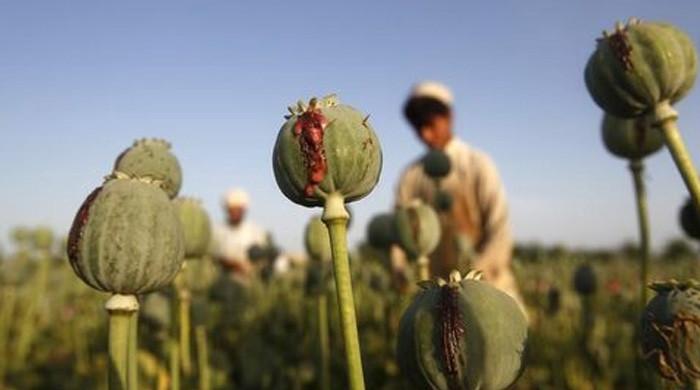- Poppy cultivated in Pastwari and Kochmina in 25 acres.
- 40 militants, including terrorists sought, involved in poppy agriculture.
- Opium sales fund terrorism, raises a threat of national security.
An important poppy culture operation in Dera Ismail Khan of Khyber Pakhtunkhwa and the neighboring border regions of Baluchistan, Baluchistan’s borders,, The news He reported Monday.
This discovery has caused important concerns about the connection between drug trafficking and terrorism in the country.
Credible sources revealed that poppy is particularly grown in the areas of Pastwari and Kochmina. The approximately 25 poppy cultivation acres, distributed in 4 to 5 patches, have produced approximately 500 kilograms of opium, valued at around RS1.6 billion.
However, the Khyber Pakhtunkhwa states that such reports have not emerged, and even the Antarcotic Force (ANF) has not reported any poppy cultivation in the territory of KP.
“We have not received any information from any agency on this issue, but the department has received instructions to investigate the matter. It may be in the Baluchistan area,” said a KP government official.
The credible sources indicate that at least 40 militants, including the terrorists sought called Tariq Kalachi and Habib Ur Rahman, have established hiding places in the region, with more terrorists who arrive. Local sources also revealed that Afghan workers are involved in poppy cultivation, allegedly working under the financial sponsorship of the terrorist faction known as the “Faizullah Ikhwani Group.”
The sources affirm that a particularly alarming development is the online sale of opium harvested of these fields. The reports suggest that these funds finance terrorist activities in Pakistan, which represents a significant threat to national security.
The United Nations Office on Drugs and Crime (UNODC) had confirmed a strong decrease in opium production of Afghanistan until 2023. However, recent trends indicate a resurgence in drug cultivation, which leads to traffickers and militant groups to look for alternative sources, with the border regions of Pakistan emerging as a new center for the production of narcotics.
Security sources told this correspondent that immediate government intervention is essential to stop this growing crisis.
A comprehensive narcotic strategy is required to dismantle these illegal operations and cut financial resources for terrorist networks. The ANF, in collaboration with the civil administration and the agencies of application of the law, must carry out coordinated operations to eliminate the affected areas and dismantle illegal networks.
“A decisive offensive in this drug terrorism link is essential not only for the internal security of Pakistan but also for regional stability. Not acting quickly can allow these criminal networks to strengthen their support point and increase internal security threats for Pakistan,” said the official.




